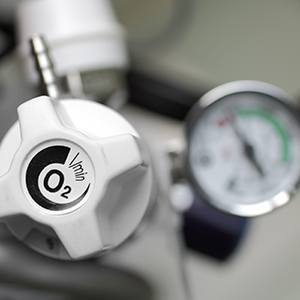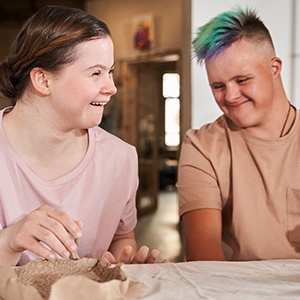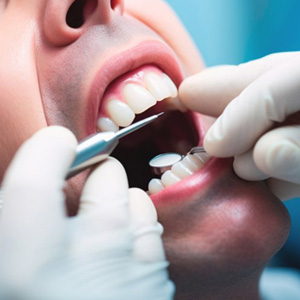
Who We Help—Special Needs Dentist in Grand Prairie, TX
Ready to Serve Every Smile

Our mission at Disability Dental Services is to give patients with a wide variety of special needs easy access to high-quality, personalized dental care in a comfortable environment. Dr. Ford and our team have several years of experience serving patients with many unique challenges, so no matter your loved one’s situation, you can trust they’ll be in great hands here. Be sure to give us a call and tell us about them so we can guarantee they have a great appointment! To learn more about some of the disabilities we’re able to accommodate, read on below.
Why Choose Disability Dental Services?
- Led by Dentist Who Only Treats Special Needs Patients
- Fun, Friendly, & Skilled Office Staff
- On-Site General Anesthesia
Intellectual Disability
(Mental retardation)

For patients with intellectual disabilities, we know that having patience is the best way to guarantee a smooth appointment. We’re more than happy to explain each part of a procedure and show what the different instruments do so the patient can understand what’s going on and relax. If needed, sedation can help calm any lingering nerves as well. In our experience, after a few good visits, patients start to unconsciously associate our office with safety and comfort, making follow-up visits nice and easy.
The Unique Dental Challenges for People with IDs

People with intellectual disabilities tend to have difficulty maintaining a self-care routine, and this includes brushing and flossing their teeth every day. As a result, they tend to experience a much higher rate of cavities, gum disease, and tooth loss compared to the rest of the population.
And, especially for those who are non-verbal, they may have oral habits they use to soothe themselves that can be detrimental to their oral health, such as thumb sucking, lip/cheek biting, or teeth grinding.
The types of medication a person is taking can lead to dental issues as well, as a common side effect is dry mouth, in which there isn’t enough saliva being produced. This makes it easier for harmful oral bacteria to develop.
And lastly, bringing a patient with an ID to the dentist can be extremely difficult, as the unfamiliar people, sounds, smells, and instruments can cause a lot of anxiety and fear. All of this is why it’s important for these kinds of patients to visit a specialist who can accommodate them and ensure they receive the care they deserve while minimizing their stress.
How We Help Patients with IDs in the Office

Dr. Ford and our team understand that the term “intellectual disability” can refer to a wide range of cognitive conditions and symptoms, which is why we never treat two patients the same way. We know to take things slow and can explain what’s going on during an appointment in various ways so the patient can feel safe and know what to expect. This may involve using pictures and demonstrations in addition to verbally explaining in a calm way.
We may recommend that you bring the patient in for a “happy visit” so they can become familiar with our office and staff. The point of the visit isn’t to provide dental care, necessarily, but rather to make a good first impression so the patient knows they are in a safe place. The patient can sit and play while the parent/caregiver talks to Dr. Ford about their dental and medical history, and then the staff will be introduced to them. Based on how things are going, we may perform a very quick and gentle exam.
As the child becomes more acclimatized to our office, we will start giving them complete checkups and cleanings, and if any issues pop up along the way, we will take the same patient approach when fixing them.
How We Help Patients with IDs at Home

In addition to hands-on care, our team can also work with you to help the patient establish an oral hygiene routine at home. We can show them how to brush and floss properly if they are able, and if not, we can show you how to do it for them in the safest and most effective way possible. We’ll recommend which oral healthcare products they should be using and provide guidelines based on their day-to-day routine so that taking care of their teeth becomes normal very quickly.
How to Prepare the Patient for Their Visit

Before you bring the patient in for a dental appointment, it’s best to start talking about the dentist a few weeks or even months beforehand. Read books to them about dental visits and play “dentist” if you can, where you and the person switch off being the dentist and patient. Through play, you can get them used to holding their mouth open so it isn’t new when they come to see us. Of course, if you ever need help or want input ahead of an appointment, you can always call our team, and we can put together a tailormade plan with you so their relationship with our office starts on the right foot.
Epilepsy

Life is unpredictable and a little scary for people with epilepsy, and our team is ready to handle whatever happens. We can sedate an epileptic patient so it’s guaranteed they remain still during their appointment, and should they suffer a seizure while in our office, our team knows how to manage it to keep them and everyone else safe.
How Do Seizures Influence Dental Care?

Being able to maintain oral health through dental checkups and cleanings and at-home oral hygiene is extremely important for avoiding complications down the road. Problems like gum disease and cavities that are left unchecked can turn into more serious issues, which may require extensive treatments that can be costly. However, this can be more challenging for patients suffering from epilepsy. Not only can seizures make dental care more difficult to perform when they occur, but there’s also the possibility that certain antiepileptic medications might cause oral health issues, such as gummy smiles and tooth grinding. That’s why, if your loved one struggles with epilepsy, you’ll want them to get treated by a qualified dentist who has the right tools and techniques to keep them safe during their dental visits.
Ways Our Team Manages Epilepsy

At Disability Dental Services, our team can help manage epilepsy through various strategies to optimize your loved ones’ experience during their appointments. In many cases, we can provide them with oral conscious sedation to not only help them relax during their treatment but also to lower the chance of seizure development. We can also use general anesthesia to further calm the body while also placing them in a euphoric state where they shouldn’t feel any pain or sensations from their procedure.
Of course, if a seizure occurs during dental care, our team is trained to implement specific actions to maximize safety. These typically involve:
- Clearing away all instruments from the patients’ vicinity
- Placing the dental chair in a supported, horizontal position nearest to the floor
- Moving the patient carefully on their side to avoid aspiration of secretions or dental materials in their mouth
- Keeping anything away from the patient’s mouth
- Administering oxygen if possible
- Being cautious of the possibility of a blocked airway or uncontrollable seizure
- Calling 911 if the patient becomes cyanotic or the seizure lasts longer than 3 minutes
After an epileptic episode occurs, our team will typically suggest postponing dental treatment for another day. We will also briefly assess your loved one’s oral health for any injuries and double-check that they’re okay before allowing them to head back home for rest.
How We Prevent Seizures During Dental Treatments

While epileptic seizures can occur at any moment, there are still certain principles we can follow to minimize their chances of occurring during dental treatments. In general, our team will first need to understand the patient’s previous seizure episodes as well as the medications they take, as this can go hand in hand with knowing the types of factors that can provoke the condition. Scheduling appointments early in the morning, keeping the visits short, and minimizing noise and bright lights can also reduce the chance of a seizure. We’ll also need to be aware of you or your loved one’s early indications that a seizure is about to occur, as we can take the proper precautions beforehand.
Muscular Dystrophy

Thanks to our wide hallways and wheelchair accessibility, patients with muscular dystrophy don’t have any issues moving through our office. With our Versatilt Wheelchair Lift, moving a patient and performing procedures without removing them from their chair is simple and comfortable.
Factors Our Team Considers

Individuals with muscular dystrophy (MD) have some special considerations that our team must account for, including:
- Structural changes in the mouth. Malocclusions (bad bites) are common among people with MD. An enlarged and weakened tongue may also occur.
- Oral hygiene challenges. Due to declining mobility, people with MD may find it difficult to thoroughly brush and floss their teeth.
- Although misaligned bites often occur among MD patients, they should not undergo orthodontic treatment unless it is administered by someone who thoroughly understands their condition.
Things We Avoid During Dental Procedures

In the interests of patient safety and comfort, there are certain things we avoid while treating patients with MD. For example, we generally avoid administering oxygen because it is not always safe in patients whose MD has affected their pulmonary function. The only time we might use oxygen is in an open system, meaning that it is mixed with room air so the oxygen concentration is not 100%. We may do this for just a few minutes after sedating a patient with nitrous oxide.
We do not shy away from using local anesthetic and nitrous oxide for MD patients. These provisions are generally very safe and pose very little risk. They can help patients to experience minimal discomfort while we are working to improve their dental health.
We also recognize that some MD patients do not like to be reclined too far back. We can try to adjust our techniques so such patients are not placed in a position that is extremely uncomfortable.
Tips for Maintaining a Healthy Mouth

MD can certainly pose some oral health challenges. However, there are things that MD patients can do to reduce their risk of serious dental problems:
- Regular dental checkups. Whereas most people benefit most from two professional dental cleanings each year, MD patients may require more frequent visits.
- Oral hygiene. Brushing 2 – 3 times per day and flossing regularly are important. An electric toothbrush and a water flosser can help individuals with mobility issues. It could also be beneficial for them to wrap their toothbrush handle in foam to create a wider, more stable grip.
- Deal with dry mouth. Some conditions that are associated with MD can cause dry mouth. Individuals with MD can ask us about prescription mouthwash that can reduce this issue and thereby lower the risk of issues like cavities, gum disease, and bad breath.
Multiple Sclerosis

We understand that sitting or lying down for an extended period can be quite unpleasant for a patient with multiple sclerosis. That’s why, in addition to offering sedation, our team will also work very efficiently while still delivering excellent care. At Disability Dental Services, we are trained on how to provide reliable dental treatments for those with multiple sclerosis and can also offer guidance on ways to manage your or your loved one’s oral hygiene routine at home.
What is Multiple Sclerosis?

As you likely already know, multiple sclerosis (MS) is a disease in the brain that negatively impacts the central nervous system or spinal cord. In many cases, this condition is disabling, as the immune system begins to attack the myelin—the protective covering of the nerve fibers—which then leads to communication issues between the brain and the body. The symptoms of multiple sclerosis are far and wide, as the disease may deteriorate or significantly damage the nerve fibers in various limbs. Some people may lose their ability to walk on their own or altogether. For this reason, our team needs to understand the symptoms and situation of our patients who have this condition so that we can develop a proper plan for their dental care.
How Can Multiple Sclerosis Affect Oral Health?

Multiple sclerosis can make it incredibly difficult for people to maintain good oral health on their own. Here are some of the main ways this disease can negatively impact a person’s dental care:
- You or your loved one’s multiple sclerosis health needs can easily distract from being able to take proper care of your/their smile.
- The situation can cause a patient to feel too fatigued or even have their mobility drastically impaired, making routine dental visits very difficult to manage.
- MS can often make it uncomfortable to care for your teeth, as it can cause you to develop fatigue, tremors, spasticity, weakness, and pain in the face.
- Certain medications for treating MS can lead to dry mouth (xerostomia), which can make it easier for harmful bacteria to accumulate. Treatments that utilize steroids or other immunosuppressants can also increase the risk of periodontal disease, which can end up spreading throughout the mouth and the rest of your body through the bloodstream.
Tips for Adjusting Oral Hygiene Routine with Multiple Sclerosis?

For those who are struggling to take care of their smile due to multiple sclerosis, here are several important tips to help you:
- Ask a caregiver or loved one to help you clean your teeth.
- Try using electric toothbrushes and flossing devices to make these easier to perform.
- Floss while you’re in bed or in the morning if you’re feeling fatigued at night.
- Take a seat while brushing and flossing if standing tires you out; rest your arm on the countertop if you experience tremors.
- Utilize flossing tools to help with flossing.
- Try using built-up handles on your toothbrush, such as making a slit in a tennis ball and sliding the toothbrush handle into it for a better hold.
- To avoid dry mouth from MS medications, sip on water frequently, avoid alcohol, caffeine, and tobacco, and use a humidifier at night to help fill the air with moisture.
The Unique Dental Challenges for People on the Autism Spectrum

As a special needs dentist, Dr. Ford understands that the keyword in the phrase “autism spectrum” is spectrum because the condition can manifest in very different ways. Some people are functional and can communicate relatively well but have sensory sensitivities, while others are nonverbal and have trouble understanding changes in their environment (like going to an unfamiliar dental office). Because of these issues and more, people on the spectrum tend to suffer from higher rates of cavities, gum disease, and tooth loss.
Sensory issues can lead someone to avoid daily oral hygiene, or they might have a restrictive diet that mainly consists of sugary foods. An inability to communicate can prevent a person from telling their caregiver that their tooth hurts or their gums are sensitive, allowing a small problem to become much larger. Thankfully, people on the spectrum don’t tend to have more congenital or genetic dental problems than the average population, but we understand that a personalized approach and gentle touch are essential when they are under our care.
How We Help People on the Autism Spectrum in the Office

Our entire team at Disability Dental Services understands that patience and adaptability are extremely important when serving patients on the autism spectrum, and thankfully, we’re able to accommodate absolutely everyone. This way, both the patient as well as their caregiver can relax while we give them a healthy, confident smile.
Most professional dental organizations as well as autism advocacy groups recommend dental desensitization, or in other words, exposing the person to the sights, sounds, smells, and people associated with the dentist in a slow, meaningful way as to not overwhelm them. That’s why we recommend that caregivers bring the patient to our office for a “get-to-know-you” visit where we won’t actually provide hands-on care. Rather, the patient will have a chance to become familiar with our office and staff. We can become aware of any sensitivities before they are sitting in the chair, and if they have questions for us, we’ll take all the time needed to answer them. That way, when they come in for a procedure, it will go much smoother.
How to Prepare the Patient for Their Visit

Other than scheduling the pre-visit we mentioned above, we ask that you call ahead and let your dentist for disabled adults know about any sensitivities or preferences the patient has so they can keep them in mind once they are here. At home, try to explain the basics of how a dental visit works, and there are plenty of friendly, easy-to-understand picture books that can help with this.
Be prepared to stay with the patient throughout their visit to the office. You will not only provide a source of comfort but also help them communicate with the staff. This will help us keep them calm and relaxed and ensure we fully understand their needs. It’s also recommended to bring a comfort item if they have one, be it a stuffed animal, toy, or anything else they can use to self-soothe.
How We Help People on the Autism Spectrum at Home

One of our big goals for people on the spectrum is to help them establish a consistent oral hygiene routine at home that involves daily brushing and flossing. We can use a variety of methods to communicate why these practices are important, plus we will explain the proper techniques for each step. We’ll also work with you to give them the tools they need to communicate if they are experiencing tooth pain or another type of dental issue.
In addition to using visual aids and brushing alongside them at home to establish the routine, it’s also important to find the right brush, toothpaste, floss, and mouthwash that avoids any sensitivities. Once a patient discovers a flavor or texture that they like (or doesn’t cause discomfort), then at-home care typically becomes much easier.
Down Syndrome

People with Down syndrome tend to suffer from a higher rate of oral health issues like cavities and missing teeth compared to the average population, which is why we highly prioritize hygiene and at-home care with this type of patient. For those who are nervous or scared of the dentist, our team’s warm demeanor is tremendously helpful, and our sedation services can also soothe them so that they feel completely safe.
The Unique Dental Challenges for People with Down Syndrome

People with Down Syndrome can develop oral health problems more often than the average population because of factors like:
- Difficulty establishing and maintaining oral hygiene at home.
- Issues with maintaining a “teeth healthy” diet.
- A compromised immune system that makes oral infections more likely.
- Small teeth and an underdeveloped upper jaw that can cause an unbalanced bite.
- Undersized upper jaw, which can lead to permanent teeth becoming impacted (stuck while erupting).
- Larger than average tongue that can place pressure on the teeth and alter their position over time.
How We Help People with Down Syndrome in the Office

Our main goal when we first meet a patient with Down Syndrome is to make sure they feel comfortable in our office and around our staff. To help with this, please speak with our team before bringing your child or family member in for an appointment. If they are afraid of dental care or can’t self-soothe, we might recommend sedation to help calm their nerves.
From there, a big part of their care will revolve around making sure their teeth and bite line up properly. Doing so will correct any misalignments (which can lead to pain as well as chewing, speaking, and breathing problems) and also allow the permanent teeth to come in without issue. To accomplish this, we may recommend orthodontic treatment, in which case they will be referred to a specialist.
They will receive routine cleanings, and a big focus will be on preventing and/or managing gum disease. Gum disease is the most common dental problem in the entire world, and in addition to having symptoms like red, swollen, and tender gums, it is also the leading cause of tooth loss. Plus, oral infections caused by gum disease have been shown to strongly correlate with other health problems, namely cardiovascular disease and diabetes.
How We Help People with Down Syndrome at Home
If your loved one doesn’t have a consistent oral hygiene routine at home that involves brushing, flossing, and using a mouth rinse, we can help them establish one. Particularly, finding a mouth rinse and flossing tool that a patient likes is paramount in the ongoing prevention of gum disease. Instead of brushing twice a day, people with Down Syndrome can benefit from brushing three times a day, and perhaps after every meal and snack depending on the state of their oral health.
How to Prepare the Patient for their Visit
On top of contacting our team prior to their visit so we can prepare for them, you can also prep at home to ensure things go as smoothly as possible. Talk about the dentist with your loved one days or weeks ahead of time so they aren’t surprised, and try to only do so in a positive way. If they have never been before, you can read picture books to them so they have a better idea of what to expect (many are easily available). You can even “play” dentist, during which they get used to holding their mouth open like for an exam or cleaning. You might also plan to have them bring a comfort item (like a toy, stuffed animal, or blanket) to help them feel more at ease in the office.
Cerebral Palsy

There are many layers to cerebral palsy, and no patient’s condition is exactly the same. That’s why we’ll discuss a patient’s particular challenges before their appointment so we can accommodate them in every way. Our office is designed for easy assisted mobility and is extremely wheelchair accessible, plus sedation can be used to help the patient both physically and mentally relax.
How Does Cerebral Palsy Affect a Patient’s Dental Health?

Due to the difficulties one may face with cerebral palsy in effectively maintaining clean teeth, patients with this condition are typically at a higher risk of developing dental health issues. For this reason, dental disease screening is one of the recommended portions of a patient’s oral evaluation. Cerebral palsy makes it difficult for a person to control and move their limbs, which is precisely the kind of movement needed for brushing and flossing teeth.
Patients with cerebral palsy can also have a heightened risk of dental trauma. This can be due to some having flared upper teeth as well as having a greater chance of falling because of motor impairment. Without proper protection or supervision, this could lead to dental damage and accidents.
Types of Cerebral Palsy Oral Health Problems

Some of the most common oral health issues found in patients with cerebral palsy include:
- Periodontal disease – With the inability to brush and especially floss between the teeth and beneath the gum line, a person can have a higher risk of forming gingivitis or periodontitis.
- Dental caries – Also known as decay or cavities, these can be a result of bacteria formed from foods that create an acid byproduct that eats away at the teeth.
- Trouble swallowing – Dysphagia (difficulty swallowing) is typical for those with cerebral palsy, which allows food to remain in the mouth for too long, increasing the risk of decay.
- Malocclusion – This is when the upper and lower teeth don’t properly align, which can introduce bacteria as well as raise the risk of dental damage.
- TMJ disorders – The temporomandibular joint connecting the jawbone to the skull can end up functioning improperly, which can lead to chewing trouble and pain.
How to Prepare Your Loved One for a Dental Appointment

While it might feel stressful to help your loved one with cerebral palsy get the dental care they need, our team is more than happy to walk you through ways to prepare them for their appointments. Firstly, we’ll want to learn about the unique challenges your loved one is experiencing so that we can determine the proper utilities to help during their visit. Our office is wheelchair accessible and can accommodate most patients with mental and physical disabilities. You’ll also want to schedule their appointment as early as possible so that our team has plenty of time to work with them. Be sure to inform our team of any medications your loved one is taking so that we can ensure they remain safe during treatment.
Dementia/Alzheimer’s

Patients with dementia/Alzheimer’s need to receive regular oral care to preserve their overall health and quality of life. Our team understands that a lot of patience is necessary and that a patient might not always understand what is going on. We’ll try to explain everything as best as we can, and if the patient is anxious, we can use sedation to calm their mind so they can quickly relax.
How Dementia/Alzheimer's Impacts a Person’s Oral Health

In many cases, those who are struggling with dementia/Alzheimer’s disease can show indications of their condition through the health of their mouth. Since these patients can start to forget about taking care of their oral health, or how to do so, this can gradually lead them to allow issues with their teeth and gums to progress in the future. For some patients with Alzheimer's, there might be an accumulation of plaque and calculus or the development of inflamed or bleeding gums along with cavities. That’s why a patient should be diagnosed early on since their dental team can start to educate them on oral care via basic, digestible guidelines that will help them form something like muscle memory.
Ways to Maintain Oral Health with Dementia/Alzheimer's

Should your loved one forget how to keep their teeth clean, you’ll likely need to take a more hands-on approach when helping them maintain their smile. Here are several tips to follow when it comes to taking care of their oral health:
- Prepare for tooth-brushing, which doesn’t have to happen in the bathroom
- Choose the proper toothbrush (soft-bristled) that’s most comfortable for them
- Provide basic instructions for your loved one to understand
- Use the “Watch Me” method or help them clean their teeth yourself
- Take care of their dentures, if they have some
- Consult their dentist so you have the best knowledge on how to maintain their smile
How to Prepare Your Loved One for Their Dental Appointment

Make sure that your loved one gets plenty of sleep so that they can feel as calm and comfortable as possible when they arrive for their visit. This can hopefully get easier over time as long as you bring them into the office regularly for checkups and cleanings. Those with Alzheimer's/dementia should have a chaperone or loved one present in the exam room while they undergo dental care. Not only will this make them more at ease, but you can also learn how to help with their oral healthcare at home.